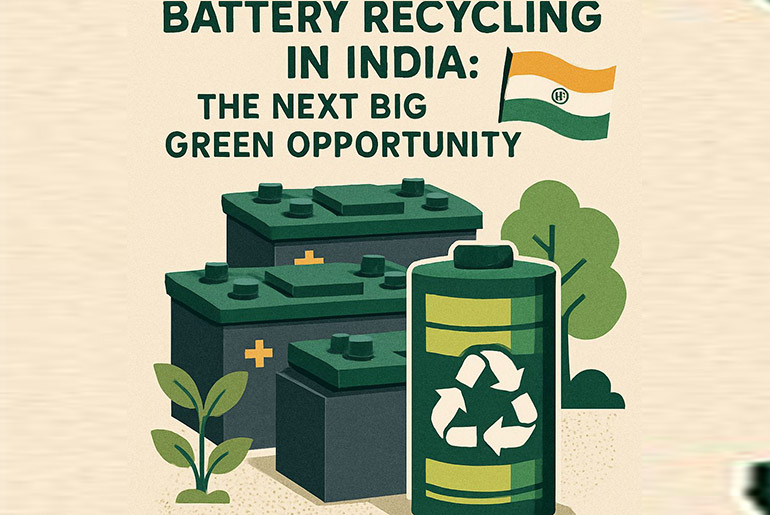India’s electric vehicle revolution is picking up pace at a phenomenal rate. With ambitious government targets, fuel price spikes, and increasing green awareness, the transition to EVs is well underway. But lurking beneath the optimism is a growing worry: what to do with the batteries once their life runs out? Lithium-ion batteries, in propelling our eco-friendly mobility dreams, are an acute environmental threat if not recycled or disposed of. As India prepares to cope with a spent battery boom, the issue of a proper battery recycling system is more pressing than ever before.
Why Battery Recycling Matters?
Batteries can potentially provide materials for future use. The materials lithium, manganese, cobalt, and nickel can all be found in used batteries, so used batteries are not useless or waste. If batteries are disposed of improperly as waste, there can be hazardous chemical spills and contamination of water, and there is even a risk of fire, as battery chemistry is most likely to occur through lithium-ion batteries. For one thing, the probable danger of producing new batteries to delete and the loss of materials affects the ecosystem, which lowers the environmental footprint of battery production, reduces the need for imports to deliver materials, and loses the finite materials or resources that are produced. Moreover, a successful recycling system sustains a circular economy that gives sustainability and long-term sustainability through extension of material chains through reuse and reuse.
The Current Scenario in India
India is estimated to produce more than 2 million tonnes of waste from lithium-ion batteries by the year 2030. However, the existing recycling mechanisms are not sufficient enough to cope with this amount. There are few formal recycling centers, and most of the battery waste finds its way to unscientific and unsafe informal recycling centers. However, the times are changing. Organizations such as Attero Recycling, Lohum Cleantech, Gravita India, and Metastable Materials are majorly working to formalize battery recycling. These organizations are creating cutting-edge technologies to recover up to 95% of precious material from used batteries while maintaining environmental safety.
Landscape of Policy and Regulation
The Battery Waste Management Rules, 2022, were introduced by the Indian government under the Environment Protection Act after they realized how urgent the situation was. Extended producer responsibility (EPR), which requires battery manufacturers to gather and recycle used batteries, is mandated by these regulations. The policy places a strong emphasis on safe recycling procedures, traceability, and reuse. Enforcement is still difficult, though, and industry awareness is still developing. The key to putting policy into practice will be providing incentives for the establishment of recycling infrastructure, support for research and development, and explicit implementation guidelines.
Difficulties in Expanding Battery Recycling
In India, a number of obstacles prevent battery recycling from becoming widely used. Recycling techniques need to advance technologically to manage complex chemistries and guarantee high recovery efficiency. Because of their less detrimental effects on the environment, hydrometallurgical processes—which use aqueous solutions—are becoming more and more popular than conventional pyrometallurgical (smelting) techniques. Logistically, collecting and transporting used batteries is also difficult, particularly in a country the size of India. Furthermore, recycling is less appealing to smaller players because its profitability is dependent on the scale of operations and the fluctuating prices of recovered metals.
Global Best Practices
Around the world, nations such as the European Union, China, and the United States are adopting tough battery recycling laws and setting up recycling centers. The EU Battery Directive requires high rates of recovery and traceability, while China has developed a closed-loop system with EV manufacturers and recyclers. The U.S. is spending big on local battery recycling under the Inflation Reduction Act. India can take cues from these models by introducing centralized collection networks, paying incentives to recyclers, and incorporating recycling in the design and production of batteries.
The Indian battery recycling market can expand to USD 1.5 billion by 2030. The future will see the use of automation, robots, and AI in recycling operations for greater safety and efficiency. Blockchain can have uses in tracking battery life cycle and in ensuring compliance. With a forward-looking mindset, India can not only handle battery waste but become a world leader in green battery recycling. To achieve this, policymakers, industry players, researchers, and startups need to come together.
As India accelerates its shift toward electric mobility and renewable energy, battery recycling must become a top priority. It is not only an environmental necessity but a strategic imperative to create a self-sufficient, sustainable system. With favorable policies, clean technologies, and collaborative action, India can turn battery waste into a vibrant green economy. The moment is now—before today’s clean energy ideals become tomorrow’s toxic burden.



